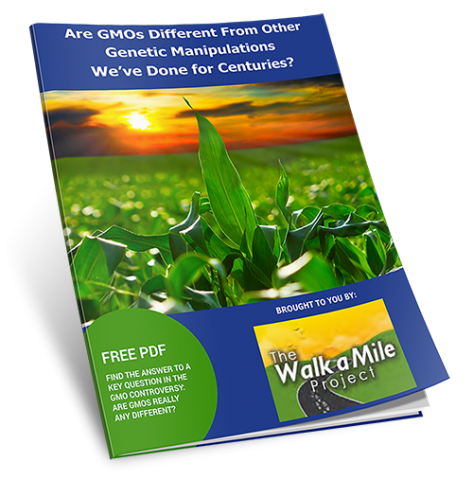Most of us believe our farmers are doing the best they can to provide safe food while being mindful of the environment. License to Farm, a documentary now available on YouTube, reinforces this belief by spotlighting various Canadian farmers and hearing their points of view. It’s similar to what we did here at The Walk A Mile Project when we interviewed Abe Wiens, also a Canadian farmer, in podcast #5, Walk a Mile in a GMO Farmer’s Shoes.
The 30-minute film comes from a 69-year-old artist living in Fort McMurray, Garry Berteig. Many scenes in the film were shot at his family’s farm in Saskatchewan, where he was born. The movie was produced in Berteig’s home studio in Fort McMurray, where he’s lived for more than 20 years, with help from his two sons Benjamin and Alexei.
One of the first questions most of us ask before we view a GMO-related documentary or read an article is “who backed it?” And in this case, unlike the completely independent work we do here at Walk a Mile, the film was funded and sponsored by the Saskatchewan Canola Development Corporation. Given that 95% of canola grown in Canada is GMO, it’s easy to see why this corporation would want to involve itself in the documentary’s production.
The License to Farm documentary is being embraced among a small agriculture community in Canada, and has received 50,000 views online. Berteig says the film has “struck a chord” with the farming community, because it speaks about the values of farmers — not just their products.
It’s an effective angle, encouraging the public to see farmers’ points of view. Yet, the documentary states that most people are less concerned about studies and the science than they are about hearing from the farmers. That’s not the case, as the two go hand in hand, and it’s a dangerous proposition to make.

License to Farm filmmaker Garry Berteig poses for a photo with his son, Benjamin Berteig, in his home studio in Fort McMurray Alta. Click the pic for original photo at: http://bit.ly/1V3PwdW
The License to Farm documentary makes many of the standard pro-GMO statements such as: everything we eat is genetically modified from its wild ancestors and GMOs are simply a progression of this; these plants have undergone very thorough testing to make sure there are no safety or environmental issues; and that regardless if crops are GMO or not, weeds will become more resistant to pesticides, for evolutionary reasons.
The documentary calls anti-gmo protestors’ ideas romanticized arguments, not scientifically based ones, but anti-GMO and pro-GMO camps are equally interested in the science — and uncovering the truth behind GMO safety should remain the ultimate aim for both.
To read the entire article, visit:
http://www.fortmcmurraytoday.com/2016/02/01/local-documentary-filmmaker-defends-gmos-and-pesticides



